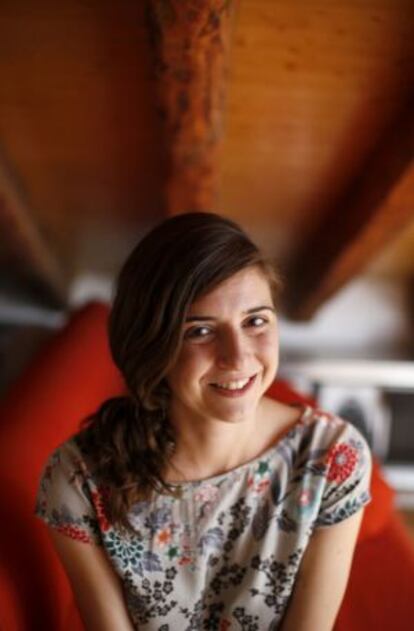"There's a lot to learn from how Indians use public space"
Architect infuses Spanish capital with Asian influences

Almudena Cano avoids architectural spectacles at all costs. "It's okay that in every city there's one architectural landmark. But not thousands." Instead, the 27-year old Madrid native opts for a more practical approach to architecture.
"Along with the construction crisis, there's been a lot of debate about the role of architects. We're here to improve living situations, to solve problems," she says.
For her final project in college, Cano gained international recognition when she studied the rehabilitation of the historic Indian city of Ahmedabad (5.5 million inhabitants). She's won so many awards, she's almost lost count. One was the Archiprix - one of the most prestigious prizes awarded for final undergraduate projects. She also won the Biennial Spanish Architecture prize.
Cano is an expert at making the most of the resources around her. She's used monsoon water to design home add-ons that offer extra space to Indian houses, common kitchens or laundry rooms.
"There's a lot to learn from the way Indians use public space," she says. "The same street could be a market in the morning, a parking lot in the afternoon, and host a wedding at night. They're very flexible."
Although she's open to inspiration from across the globe, Cano maintains a commitment to the Spanish capital. She doesn't want to have to cross the pond like some of her classmates. Though she acknowledges that lack of funding can be a problem.
Architects are here to improve living situations, to solve problems."
"Before, these awards were well endowed - maybe 15,000 euros, and they would let you keep researching. But now they're only 1,000 or 2,000 euros, like the Venice Biennial."
With her impressive credentials and support from the University of Ahmedabad, Cano hopes to make the India project she's designed a reality. "Ahmedabad wants to get on the list of cities of human cultural heritage, so they're expecting to invest more money in restoration," she says.
Cano first visited Ahmedabad in 2007 along with 14 other architecture students from the Madrid Polytechnic University (UPM). While there, she devised a construction project that would respect the traditions and lifestyle of residents while improving sanitation and access to running water. In 2011, she returned to do fieldwork.
With her project, Cano earned a spot on the doctoral program at the Royal College of London. It was too late to apply for a British scholarship, so she requested one from Spain but was denied. "These days, there are fewer scholarships, and the average grades in architecture aren't high. I have a 7.5. It's impossible to compete with other majors," she says.
Cano's dream is to link her proposed project - the Laboratory of Anthropology and Architecture - with her alma mater, the UPM. Cano launched this lab with fellow architect Isabel Gutiérrez, also 27.
"We want to create a way for the needs of neighbors to be channeled to government administrations," says Cano. In Madrid's case, this might include self-managed public spaces such as La Cebada or the urban gardens. "These are very residual experiments in self-management, and we could have to create a theoretical framework to make them a structural reality."
In September, Cano plans to submit the project to a contest in Dehli on the use of public space. The two women will present their project in a team comprised of two Indians, a Bengali and a Dutch woman she met at the Archiprix competition. "Things of today's globalized world!" she muses.
Tu suscripción se está usando en otro dispositivo
¿Quieres añadir otro usuario a tu suscripción?
Si continúas leyendo en este dispositivo, no se podrá leer en el otro.
FlechaTu suscripción se está usando en otro dispositivo y solo puedes acceder a EL PAÍS desde un dispositivo a la vez.
Si quieres compartir tu cuenta, cambia tu suscripción a la modalidad Premium, así podrás añadir otro usuario. Cada uno accederá con su propia cuenta de email, lo que os permitirá personalizar vuestra experiencia en EL PAÍS.
¿Tienes una suscripción de empresa? Accede aquí para contratar más cuentas.
En el caso de no saber quién está usando tu cuenta, te recomendamos cambiar tu contraseña aquí.
Si decides continuar compartiendo tu cuenta, este mensaje se mostrará en tu dispositivo y en el de la otra persona que está usando tu cuenta de forma indefinida, afectando a tu experiencia de lectura. Puedes consultar aquí los términos y condiciones de la suscripción digital.









































